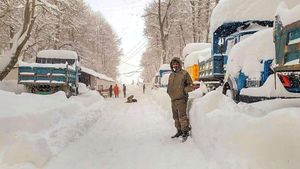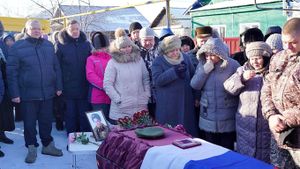The Israeli-Palestinian conflict continues to intensify amid renewed protest actions and alarming reports of forced displacements. Recently, Palestine Action Scotland has taken direct action against companies like Biffa Limited, accusing them of complicity in the violence against Palestinians.
Activists targeted Biffa’s premises in Glasgow and Edinburgh, smashing windows and spray painting messages such as ‘Drop Leonardo’ to highlight the company's association with arms manufacturers Leonardo and Thales. These companies are reportedly involved in supplying weaponry, including systems for Israel's F-35 fighter jets, which have been used against Palestinian civilians and frequently contribute to the military’s operations.
The protests coincided with increasingly violent actions against Palestinians, particularly during military operations targeting areas like Jenin and Tulkarm. The Palestinian Foreign Ministry has reported the forcible displacement of around 15,000 Palestinians from Jenin, accusing Israeli forces of executing these actions at gunpoint. According to the ministry, these tactics represent blatant violations of international law and are aimed at imposing stricter control over Palestinian territories.
“The (Israeli) occupation is carrying out the crime of forced displacement... at gunpoint,” the ministry stated, condemning the demolitions and army raids. This sentiment echoes through many international platforms, where calls for accountability are growing louder. The ministry added, “These crimes represent a flagrant violation of international law...,” emphasizing the urgency for decisive international intervention.
This brutal situation escalated after the recent ceasefire and prisoner exchange deal, marking the beginning of Israel’s campaign to ‘defeat terrorism’ within the occupied territories. Reports indicate not only the displacement but also significant casualties, with at least 905 Palestinians killed across the West Bank since the commencement of hostilities on October 7, 2023. These figures bring grave concerns to light as violence surges and civilians bear the brunt.
Meanwhile, the Israeli Defense Forces (IDF) have intensified their activities, leading to fatal incidents. Recently, two Israeli soldiers were killed, and eight were injured during shootings purportedly linked to the IDF’s aggressive policies against occupied territories. Palestinian armed groups, including Hamas and Palestinian Islamic Jihad, are reportedly highlighting these incidents as direct responses to what they call Israeli aggression.
UN representatives have expressed deep concerns for the stability and safety of the communities within the Jenin refugee camp, increasingly recognized as being on the brink of catastrophe. Juliette Touma, of the UN agency for Palestinian refugees (UNRWA), noted the extensive destruction of homes and infrastructure, stating succinctly, “This detonation happened when children were supposed to go back to school,” emphasizing the grave impact of these military operations on innocent civilians.
On the heels of these violent protests was the demonstration held on January 18, 2024, which stirred significant public uproar over police tactics related to pro-Palestine marches. The Metropolitan Police faced scrutiny for their approach, which included 77 arrests during the protest—an unusually high number raising concerns about the potential overreach of law enforcement.
A letter from the Convivencia Alliance noted, “The shock tactic used of arresting demonstrators appears to be... to intimidate demonstrators and restrict the right to lawful protest.” Critics argue this shows prioritization of concerns from Zionist groups over the fundamental rights of peaceful demonstrators and paints a troubling picture of policing amid tense political climates.
The suppression of protests continues even as Palestinian leaders, including President Mahmoud Abbas, push for international interventions, calling for emergency sessions of the UN Security Council to discuss actions being taken against Palestinian communities. With calls for international accountability mounting, the Palestinian cause seems to struggle against increasing isolation and military pressure from Israeli authorities.
The spiral of violence and humanitarian crises has not gone unnoticed, with significant international commentary surrounding the plight of the Palestinian people. Calls for both domestic and international communities to act against the perceived injustices continue to escalate. The current state of the Israeli-Palestinian conflict evokes urgent questions about civil liberties, human rights, and international response strategies.
Your lenses on this complex geopolitical situation reveal the harsh realities faced by ordinary individuals caught between militarized responses and growing political tension. Activism, counter-movements, and international dialogue now remain intertwined as stakeholders fight for recognition and resolution on both sides.



